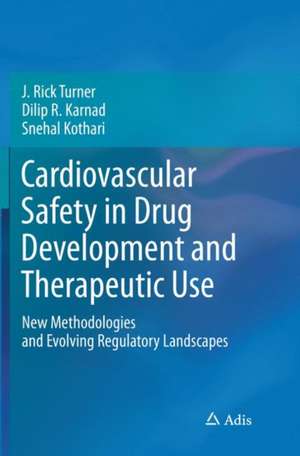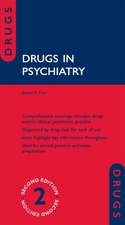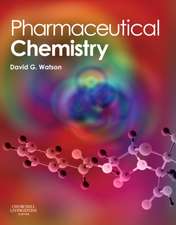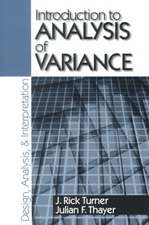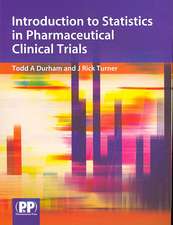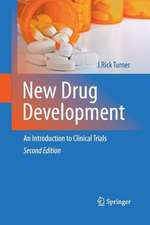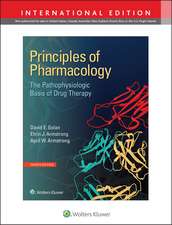Cardiovascular Safety in Drug Development and Therapeutic Use: New Methodologies and Evolving Regulatory Landscapes
Autor J. Rick Turner, Dilip R. Karnad, Snehal Kotharien Limba Engleză Paperback – 11 iun 2018
Developments in the field of cardiovascular safety are also described and discussed in the book. These include the search for more efficient ways to exonerate new drugs for type 2 diabetes from an unacceptable cardiovascular liability, how best to address off-target blood pressure increases induced by noncardiovascular drugs, and the continued evolution of the discipline of Cardio-oncology.
“a resource that will likely serve as a standard for years to come”
- Dr Jonathan Seltzer
Therapeutic Innovation & Regulatory Science, 2017;51(2):180
“I have no hesitation in recommending this book as a valuable reference source”
- Dr Rashmi Shah
Journal for Clinical Studies, 2017;9(1):62-63
| Toate formatele și edițiile | Preț | Express |
|---|---|---|
| Paperback (1) | 490.23 lei 38-44 zile | |
| Springer International Publishing – 11 iun 2018 | 490.23 lei 38-44 zile | |
| Hardback (1) | 679.04 lei 38-44 zile | |
| Springer International Publishing – 8 aug 2016 | 679.04 lei 38-44 zile |
Preț: 490.23 lei
Preț vechi: 516.03 lei
-5% Nou
Puncte Express: 735
Preț estimativ în valută:
93.81€ • 98.14$ • 77.92£
93.81€ • 98.14$ • 77.92£
Carte tipărită la comandă
Livrare economică 29 martie-04 aprilie
Preluare comenzi: 021 569.72.76
Specificații
ISBN-13: 9783319820859
ISBN-10: 3319820850
Pagini: 342
Ilustrații: XXVI, 342 p. 2 illus. in color.
Dimensiuni: 155 x 235 mm
Greutate: 0.76 kg
Ediția:Softcover reprint of the original 1st ed. 2017
Editura: Springer International Publishing
Colecția Adis
Locul publicării:Cham, Switzerland
ISBN-10: 3319820850
Pagini: 342
Ilustrații: XXVI, 342 p. 2 illus. in color.
Dimensiuni: 155 x 235 mm
Greutate: 0.76 kg
Ediția:Softcover reprint of the original 1st ed. 2017
Editura: Springer International Publishing
Colecția Adis
Locul publicării:Cham, Switzerland
Cuprins
The Central Importance of Cardiovascular Safety in Contemporary New Drug Development.- The Biological Basis of Drug Responses.- Cardiovascular Structure, Function, Pathophysiology, & Disease.- The Current Regulatory Landscape.- The "Comprehensive In Vitro Proarrhythmia Assay" Initiative.- The "Early ECG Assessment" Initiative.- The "Submission of Extended Digital ECG Data" Initiative.- Meta-analysis and Meta-methodology.- Current Regulatory Landscapes and their Potential Evolution.- Off-target Blood Pressure Responses to Non-cardiovascular Drugs.- Oncology Drug Development and Therapeutics: Cardiotoxicity Considerations.- Postmarketing Surveillance.- Regulatory Perspectives on General Drug Safety.- Future Directions in Cardiovascular Safety.- References.
Recenzii
“Dr Turner and his colleagues have done the drug development community a service by providing a compendium of cardiovascular safety. They have done a masterful job of placing cardiovascular safety firmly within the context of overall drug development. As such, Cardiovascular Safety in Drug Development and Therapeutic Use is a book that should be on the shelf of every drug developer.” (Jonathan H. Seltzer, Therapeutic Innovation Regulatory Science, Vol. 51 (2), March, 2017)
“This book brings together a wealth of information … state-of-the-art knowledge on the mechanisms involved in drug-induced adverse cardiovascular effects and the investigational strategies available to characterise drugs for these effects. … The authors deserve our congratulations for their immense efforts and well-presented contribution to the scientific community. … It caters for all professionals interested in cardiovascular safety of drugs, including academic, regulatory and pharmaceutical scientists. I have no hesitation in recommending this book as a valuable reference source.” (Dr. Rashmi Shah, Journal for Clinical Studies, Vol. 9 (1), 2017)
“The aim is to provide researchers and clinicians fundamental knowledge in the field of biopharmaceutical cardiovascular safety in a comprehensive manner. This book is written for readers at all levels of involvement with drug development and therapeutic use, from pharmaceutical researchers to pharmacists and physicians. … Impressive features of the book include the extensive references and further reading lists at the end of each chapter … .” (John C. Gulotta, Doody's Book Reviews, November, 2016)
“This book brings together a wealth of information … state-of-the-art knowledge on the mechanisms involved in drug-induced adverse cardiovascular effects and the investigational strategies available to characterise drugs for these effects. … The authors deserve our congratulations for their immense efforts and well-presented contribution to the scientific community. … It caters for all professionals interested in cardiovascular safety of drugs, including academic, regulatory and pharmaceutical scientists. I have no hesitation in recommending this book as a valuable reference source.” (Dr. Rashmi Shah, Journal for Clinical Studies, Vol. 9 (1), 2017)
“The aim is to provide researchers and clinicians fundamental knowledge in the field of biopharmaceutical cardiovascular safety in a comprehensive manner. This book is written for readers at all levels of involvement with drug development and therapeutic use, from pharmaceutical researchers to pharmacists and physicians. … Impressive features of the book include the extensive references and further reading lists at the end of each chapter … .” (John C. Gulotta, Doody's Book Reviews, November, 2016)
Notă biografică
J. Rick Turner, BSc (Hons), PGCE, PhD, DSc, is an experimental research scientist, clinical trialist, author, editor, and educator. He spent the first part of his professional career in the field of Cardiovascular Behavioral Medicine, detailing the individual differences apparent in cardiovascular responses to behavioral and psychological stressors, including genetic influences upon them. He received two international awards for his research, and is Co-Editor of the 2013 Springer volume Encyclopedia of Behavioral Medicine, the definitive work in this area.
Dr Turner is currently Chief Scientific Advisor, Cardiac Safety Services, and Senior Scientific Director, Clinical Communications, Quintiles. He is also member of Quintiles’ Cardiovascular and Diabetes Centers of Excellence. He is the author and co-author of over 120 publications in peer-reviewed journals, and the author, co-author,and editor of 15 books. Additionally, he holds the positions of Adjunct Professor of Pharmacy Practice, Campbell University College of Pharmacy & Health Sciences, and President and Chief Scientific Officer, Turner Medical Communications.
Dilip R. Karnad, MD, FACP, FRCP (Glasg), is an internist and an expert in cardiac safety with extensive clinical, research and teaching experience. He is currently Head of the Research Team, Cardiac Safety Services, Quintiles. He has a particular interest in statistical approaches to cardiac safety assessments, and has published over 20 papers in this field. He is a Fellow of the American College of Physicians and a Fellow of the Royal College of Physicians (of Glasgow), and also a practicing internist and critical care physician affiliated to Jupiter Hospital, Thane.
Snehal Kothari, MD, DM, FACC, FESC is a cardiologist and an expert in cardiac safety with extensive clinical, research and teaching experience. He is currently Chief Medical & Scientific Officer of the Core ECG Laboratory, Cardiac Safety Services, and Global Head of the Cardiac Safety Centre of Excellence, Quintiles. He is also a practicing Interventional Cardiologist affiliated to Lilavati Hospital & Research Centre, Mumbai. He is the recipient of over 30 awards and honors, and is a Fellow of the American College of Cardiology, the European Society of Cardiology, and the Asian Pacific Society of Cardiology. He has over 80 peer-reviewed publications and published abstracts.
Dr Turner is currently Chief Scientific Advisor, Cardiac Safety Services, and Senior Scientific Director, Clinical Communications, Quintiles. He is also member of Quintiles’ Cardiovascular and Diabetes Centers of Excellence. He is the author and co-author of over 120 publications in peer-reviewed journals, and the author, co-author,and editor of 15 books. Additionally, he holds the positions of Adjunct Professor of Pharmacy Practice, Campbell University College of Pharmacy & Health Sciences, and President and Chief Scientific Officer, Turner Medical Communications.
Dilip R. Karnad, MD, FACP, FRCP (Glasg), is an internist and an expert in cardiac safety with extensive clinical, research and teaching experience. He is currently Head of the Research Team, Cardiac Safety Services, Quintiles. He has a particular interest in statistical approaches to cardiac safety assessments, and has published over 20 papers in this field. He is a Fellow of the American College of Physicians and a Fellow of the Royal College of Physicians (of Glasgow), and also a practicing internist and critical care physician affiliated to Jupiter Hospital, Thane.
Snehal Kothari, MD, DM, FACC, FESC is a cardiologist and an expert in cardiac safety with extensive clinical, research and teaching experience. He is currently Chief Medical & Scientific Officer of the Core ECG Laboratory, Cardiac Safety Services, and Global Head of the Cardiac Safety Centre of Excellence, Quintiles. He is also a practicing Interventional Cardiologist affiliated to Lilavati Hospital & Research Centre, Mumbai. He is the recipient of over 30 awards and honors, and is a Fellow of the American College of Cardiology, the European Society of Cardiology, and the Asian Pacific Society of Cardiology. He has over 80 peer-reviewed publications and published abstracts.
Textul de pe ultima copertă
With the advent of multiple new therapeutic agents for a variety of important diseases has come an increasing realization that many of these drugs can have adverse effects on the heart and vascular system. As this book so elegantly details the mechanisms by which harm occurs are highly complex, many times predictable, but always clinically relevant.
Notable experts in the field of cardiovascular medicine, such as Drs. Turner, Karnad, and Kothari, have turned their attention to this thorny problem, and begun to dissect the diverse mechanisms by which cardiac harm can occur with a variety of non-cardiac drugs. This is no easy task, given the complexity of the diseases we treat, and the wide spectrum of new therapies we seek to apply. However, it is an issue with which all health care providers must become familiar in order to prescribe appropriate therapy while safeguarding patients against avoidable and life-threatening cardiac adverse effects.
This compendium represents the state-of-the-art in the evolving field of cardiac safety and is vital reading for those interested in developing new chemical entities, as well as those who prescribe them and monitor patients for their hazard. As such, I recommend this book as essential reading for students, scientists, and health care providers at all levels of training.
Peter R. Kowey, MD, FACC, FAHA, FHRS
Lankenau Institute for Medical Research & Thomas Jefferson University
Notable experts in the field of cardiovascular medicine, such as Drs. Turner, Karnad, and Kothari, have turned their attention to this thorny problem, and begun to dissect the diverse mechanisms by which cardiac harm can occur with a variety of non-cardiac drugs. This is no easy task, given the complexity of the diseases we treat, and the wide spectrum of new therapies we seek to apply. However, it is an issue with which all health care providers must become familiar in order to prescribe appropriate therapy while safeguarding patients against avoidable and life-threatening cardiac adverse effects.
This compendium represents the state-of-the-art in the evolving field of cardiac safety and is vital reading for those interested in developing new chemical entities, as well as those who prescribe them and monitor patients for their hazard. As such, I recommend this book as essential reading for students, scientists, and health care providers at all levels of training.
Peter R. Kowey, MD, FACC, FAHA, FHRS
Lankenau Institute for Medical Research & Thomas Jefferson University
Caracteristici
Cutting-edge descriptions and explanations of state-of-the-art cardiovascular safety assessments enable readers to get up to speed quickly. No other book provides such a comprehensive overview of one of the most important topics in drug development and therapeutic use
Early chapters provide discussions of background material to make the book a self-contained, single resource for readers
In addition to the 500 references cited in the book’s chapters, 900 Further Readings are provided for readers, making the book an extremely valuable compendium of research in this field
A special chapter provides a safety perspective on additional aspects of drug development and therapeutic use, placing cardiovascular safety within the larger field of general drug safety
Early chapters provide discussions of background material to make the book a self-contained, single resource for readers
In addition to the 500 references cited in the book’s chapters, 900 Further Readings are provided for readers, making the book an extremely valuable compendium of research in this field
A special chapter provides a safety perspective on additional aspects of drug development and therapeutic use, placing cardiovascular safety within the larger field of general drug safety
